

GENIOS ACUÁTICOS. Water Spirit Legends 1. Edited by D.
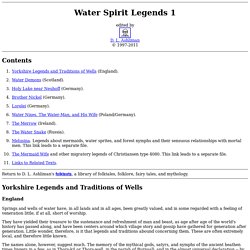
L. Ashliman © 1997-2011 Contents Return to D. Yorkshire Legends and Traditions of Wells England Springs and wells of water have, in all lands and in all ages, been greatly valued, and in some regarded with a feeling of veneration little, if at all, short of worship. They have yielded their treasure to the sustenance and refreshment of man and beast, as age after age of the world's history has passed along, and have been centers around which village story and gossip have gathered for generation after generation. The names alone, however, suggest much. The tokens of medieval reverence for wells are abundant. Thus in Yorkshire we have Our Lady's Well or Lady Well, St. Water Demons Scotland In many of the deep pools of the streams and rivers guardian-demons were believed to reside, and it was dangerous to bathe in them.
On one occasion a diver was got to got to the bottom of such a pool to fetch up the plate of the neighboring castle. Holy Lake near Neuhoff Germany Brother Nickel Lorelei.
CHAPTER XII THE SPIRITS OF THE WATER. Sacred-Texts Native American South American Index Previous Next p. 241 Names and general appearance: Anthropomorphic (177); partly human, partly animal (178); Zoomorphic, as porpoise, manati, macaw (179), snake (180), big fish, Omar (181-182); derived from men or animals (183); kindly disposed on the whole—they gave man his water-jug and potato (184), the rattle and tobacco (185); of an amorous disposition (186-187), with strong likings for menstruating women (188-189); share, with Bush Spirits, the responsibility for sickness, accident, and death (190); responsible also for the Tidal Wave (191); they object to mention of their names and antecedents (192); to a pot-spoon being washed outside the traveling boat (193); and woe betide the yoyager if he dares to utter certain forbidden words (194). 177.* The Water Spirits, whether anthropomorphic or zoomorphic, are known as Ori-yu or Orehu (Arawak), Ho-aránni (Warrau), Oko-yumo (Carib), etc.
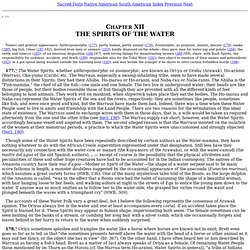
P. 244. Water Spirits. In this article I intend to focus on the belief reports, legends and descriptions of customs concerning the bodies of water and water-related supernatural beings recorded from the Votian linguistic area in the Votian language. 1 As compared with the analogous Finnish (Jauhiainen 1998: 257-266), Estonian and Livonian material (see, for example, Loorits 1998: 111-210) the records of Votian folklore are scarce and relatively fragmentary, comprising a total of 120 shorter or longer texts.
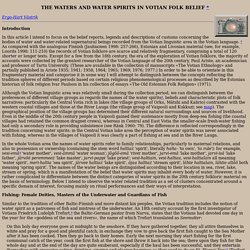
Except for a few from the 18th century, the era of the exploration of Votian folklore, the majority of accounts were collected by the greatest researcher of the Votian language of the 20th century, Paul Ariste, an academician and professor of Tartu University. (These are available in the collection of manuscripts «The Votian Ethnology» and partially published in Ariste 1935; 1941; 1958; 1964; 1965; 1969; 1976; 1977.) On this holy day everyone goes at midnight to the seashore. Meez meni ühell oHtogoll. Neck (water spirit) The Nyx/Nixie (German: Nix/Nixie/Nyx, Norwegian: Nøkk or plural: Nøkken) are shapeshifting water spirits who usually appear in human form.
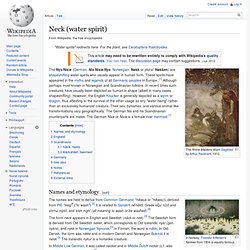
These spirits have appeared in the myths and legends of all Germanic peoples in Europe.,[1] Although perhaps most known in Norwegian and Scandinavian folklore. In recent times such creatures have usually been depicted as human in shape (albeit in many cases shapeshifting). However, the English Knucker is generally depicted as a wyrm or dragon, thus attesting to the survival of the other usage as any "water-being" rather than an exclusively humanoid creature. Their sex, bynames, and various animal-like transformations vary geographically. The German Nix and his Scandinavian counterparts are males. The names are held to derive from Common Germanic *nikwus or *nikwis(i), derived from PIE *neigw ("to wash").[2] It is related to Sanskrit nḗnēkti, Greek νίζω nízō and νίπτω níptō, and Irish nigh' (all meaning to wash or be washed).[3]
Vol 6 (2014) LOS NOMBRES DE LOS DIOSES GRIEGOS Y ROMANOS. "Y ...
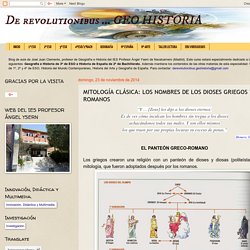
[Zeus] les dijo a los dioses eternos: Es de ver cómo inculcan los hombres sin tregua a los dioses achacándonos todos sus males. Y son ellos mismos los que traen por sus propias locuras su exceso de penas. " Homero, Odisea 31-34 Los griegos crearon una religión con un panteón de dioses y diosas (politeísta) y una mitología, que fueron adoptados después por los romanos. Mitología griega. Los dioses griegos eran inmortales y habitaban en el sagrado monte Olimpo. Vídeo: Dioses de la Mitología Griega y Romana Según la Teogonía de Hesíodo, de la masa informe (Caos) surgió la Tierra (Gea) y el Cielo (Urano) y ambos engendraron los siete Titanes. ... en construcción ...